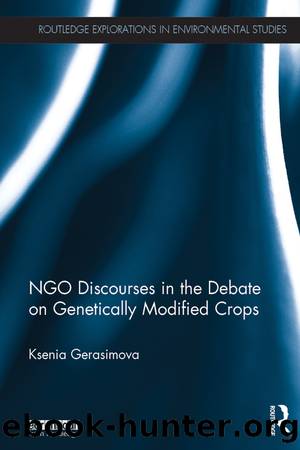NGO Discourses in the Debate on Genetically Modified Crops by Ksenia Gerasimova

Author:Ksenia Gerasimova [Gerasimova, Ksenia]
Language: eng
Format: epub
Tags: Political Science, NGOs (Non-Governmental Organizations)
ISBN: 9781315403489
Google: IMEtDwAAQBAJ
Publisher: Routledge
Published: 2017-07-20T11:38:55+00:00
He used the rising poverty in the world as an illustration of the neo-liberal regimeâs imperfections. The production paradigm argued by economists such as Paul Collier and Henry Bernstein, who supported the globalisation of food production, is global industrialised farming and food production or âthe global market-driven paradigmâ. In turn, Bello offered âa local-market-centred paradigmâ as an alternative (Bello, 2009, p. 5).
One sector was viewed as particularly dangerous to the local-market-centred model: genetic engineering, which was seen as âwrestling almost complete control of the actual physical process of production from [smallholder farming] and promised to correct the diseconomies of large-scale production that had allowed the family farm to surviveâ (Bello, 2009, p. 33). Biotechnology, he argued, has contributed to the spread of global capital by including new organisms in the input commodity production of food and a vertical integration of a global firm (Bello, 2009, p. 33).
Bello argued that the rise of biotechnology within the food industry has only strengthened such a global market-based production model, removing the farmer from production, âaccelerate[d] his or her dispossession and conversion into a rural workerâ (Bello, 2009, p. 38). Bello dismissed the argument that smallholdings are less productive and innovative than large-scale farming, as posited by Collier, for example. He instead cited van der Ploeg, who wrote that âtechnology is not only about linking artefacts and governing material flows â it is much about interlinking people in specific ways in order to obtain the rights kind of conditions and flowsâ (van der Ploeg, 2008, cited in Bello, 2009). In that sense, big business can produce only a âstandardized outflowâ, while small-scale farming can better deal with âspecificity or variationâ and âadvanced science and peasant agricultureâ should not be in contradiction but rather be incorporated into one another (Bello, 2004, p. 142). On the other side, GM seeds were enriching corporations and extending production chains. With âterminator seedâ biotechnology, he argued, âcould in fact provide the death blow to the peasantryâ (Bello, 2004, p. 33). Bello reflected upon technocracies and referred to Kuhnâs idea of cycles of scientific development, pointing to a modern scientific paradigm crisis, the main root of this crisis lies in the process of corporate-led globalisation (Bello, 2000).
Bello identified GM seeds as a tool for competing over global influence, not just in developing countries by Western nations but also among themselves. He recognised that Western countries compete for global influence and referred to âa strong corporate lobbyâ that believes that the environmental concerns of GM crops are imposed by Europe as part of a competitive strategy (Bello, 2004, p. xviii).
At the time of Seattle, the search for an alternative to global rough capitalism was popular. Even British Prime Minister Tony Blair articulated the vision of âcompassionate globalisationâ, a âThird wayâ providing âa new alternative⦠on the centre and centre-leftâ of politics but with âclear values of social justice, democracy, cooperationâ which was a combination of the liberal commitment to free trade and the social democratic commitment. It was denied by alterglobalists such as Shiva and Bello (Bello, 2000).
Download
This site does not store any files on its server. We only index and link to content provided by other sites. Please contact the content providers to delete copyright contents if any and email us, we'll remove relevant links or contents immediately.
| Automotive | Engineering |
| Transportation |
Urban Outlaw by Magnus Walker(2950)
Never by Ken Follett(2880)
OPNsense Beginner to Professional by Julio Cesar Bueno de Camargo(2802)
Sapiens and Homo Deus by Yuval Noah Harari(2414)
Machine Learning at Scale with H2O by Gregory Keys | David Whiting(2290)
A Short History of Nearly Everything by Bryson Bill(2135)
Will by Will Smith(2041)
Hooked: A Dark, Contemporary Romance (Never After Series) by Emily McIntire(1959)
Borders by unknow(1785)
Rationality by Steven Pinker(1765)
Holy Bible (NIV) by Zondervan(1716)
Freedom by Sonny Barger(1485)
The One Percenter Encyclopedia by Bill Hayes(1463)
Five Ways to Fall by K.A. Tucker(1396)
Girls Auto Clinic Glove Box Guide by Patrice Banks(1362)
Far and Near by Neil Peart(1356)
The Becoming by Nora Roberts(1330)
Cuba's Car Culture by Tom Cotter(1325)
A Short History of War by Jeremy Black(1300)
